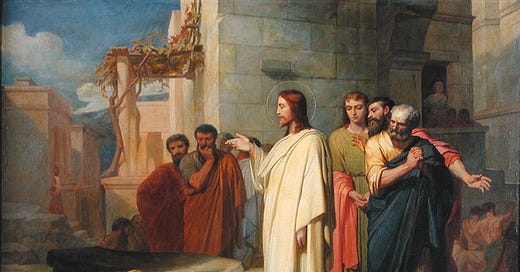Part of the mystery of suffering is knowing that God can take it away at any time. Why does He allow it to continue? We’ll probably never know, until the end of time.
But if God says He will relieve our suffering, we’d better believe Him.
Reading I
Gn 17:1, 9-10, 15-22
When Abram was ninety-nine years old, the LORD appeared to him and said: “I am God the Almighty. Walk in my presence and be blameless.”
God also said to Abraham: “On your part, you and your descendants after you must keep my covenant throughout the ages. This is my covenant with you and your descendants after you that you must keep: every male among you shall be circumcised.”
God further said to Abraham: “As for your wife Sarai, do not call her Sarai; her name shall be Sarah. I will bless her, and I will give you a son by her. Him also will I bless; he shall give rise to nations, and rulers of peoples shall issue from him.”
Abraham prostrated himself and laughed as he said to himself, “Can a child be born to a man who is a hundred years old? Or can Sarah give birth at ninety?” Then Abraham said to God, “Let but Ishmael live on by your favor!”
God replied: “Nevertheless, your wife Sarah is to bear you a son, and you shall call him Isaac. I will maintain my covenant with him as an everlasting pact, to be his God and the God of his descendants after him. As for Ishmael, I am heeding you: I hereby bless him. I will make him fertile and will multiply him exceedingly. He shall become the father of twelve chieftains, and I will make of him a great nation. But my covenant I will maintain with Isaac, whom Sarah shall bear to you by this time next year.”
When he had finished speaking with him, God departed from Abraham.
“Laughed” in ancient Hebrew is yishaq, which is also the Hebrew form of the name “Isaac,” the name they will give the son God is promising.
Abraham had a son by his wife’s handmaid,1 but not one by his wife herself. God planned for them to have a natural and full heir, regardless of their advanced age. If God wills it, if God promises it, “can a child be born to a man who is a hundred years old? Or can Sarah give birth at ninety?”
Responsorial Psalm
128:1-2, 3, 4-5
R. See how the Lord blesses those who fear him.
Blessed are you who fear the LORD,
who walk in his ways!
For you shall eat the fruit of your handiwork;
blessed shall you be, and favored.
R. See how the Lord blesses those who fear him.
Your wife shall be like a fruitful vine
in the recesses of your home;
Your children like olive plants
around your table.
R. See how the Lord blesses those who fear him.
Behold, thus is the man blessed
who fears the LORD.
The LORD bless you from Zion:
may you see the prosperity of Jerusalem
all the days of your life.
R. See how the Lord blesses those who fear him.
It’s always been true that people care about their children and their children’s future. So if God is taking care of them, that’s more than enough for most people to praise Him.
Alleluia
Mt 8:17
R. Alleluia, alleluia.
Christ took away our infirmities
and bore our diseases.
R. Alleluia, alleluia.
This verse is citing Is 53:4 here. The thing is, depending on the translation (even in Matthew’s time), “infirmities” can mean literal diseases, or sin. But as Jesus has made clear several times, sin is a disease. He frequently cures both at the same time.
Gospel
Mt 8:1-4
When Jesus came down from the mountain, great crowds followed him. And then a leper approached, did him homage, and said, “Lord, if you wish, you can make me clean.”
He stretched out his hand, touched him, and said, “I will do it. Be made clean.” His leprosy was cleansed immediately.
Then Jesus said to him, “See that you tell no one, but go show yourself to the priest, and offer the gift that Moses prescribed; that will be proof for them.”
You can see how disease was entwined with religion for ancient Jews. Per Mosaic law,2 the person recovering from a skin disease3 needed to see a priest, not a doctor, and perform certain rituals to demonstrate “cleanliness.”
Jesus doesn’t want rumors to get around about miraculous healings. It obviously doesn’t work, because the very next story is the Healing of the Centurian’s Servant.4
Both of these stories show that Jesus, who is the Word, can heal with a word.
But why this leper? Were there others in the crowd? Did they not deserve it? We have no way of knowing.
But we do know this—the leper demonstrated pure faith. He didn’t even ask Jesus to heal him; he simply stated his faith that Jesus could.
What could Jesus do in your life?
It’s complicated.
A lot of diseases were lumped under “leprosy;” they weren’t necessarily as incurable as the disease we now call leoprosy.





